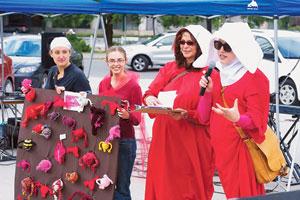
The Radical Handmaids' Wall of Wombs. Credit: Radical Handmaids
It is a scary time to be a woman. As the US presidential election nears, it seems there are endless headlines about various new laws proposed to limit, alter and even take away women’s reproductive rights. And while many Canadians look to the States and shake their heads, wondering how the American approach to women’s rights could ever go so far backward, there are similar concerns closer to home.
The House of Commons recently debated Motion 312. Introduced by Stephen Woodworth, Conservative MP for Kitchener Centre, it proposed that Parliament appoint a 12-member committee to study the legal definition of when a fetus becomes a human being. The motion addressed a section of Canada’s Criminal Code that states that a child legally becomes a human being only after successful live birth. If the committee determined that human life began before this point, it could reopen the abortion debate and, ultimately, make abortion illegal.
Enter a little group called the Radical Handmaids, a team of about 12 women inspired by The Handmaid’s Tale, Margaret Atwood’s chilling 1985 novel about a dystopian future in which an entire class of women serves as breeders for wealthy families. Taking cues from Atwood’s prose, the Radical Handmaids have adopted the red-robed costumes of the novel and taken to the streets in protest.
Xtra recently spoke with Julie Lalonde (also known as OfStephen), who explained that the group started with a Facebook thread. As people took to social media to express their disbelief that the abortion issue was once again being dredged up, it became clear there was a need to protest. But in Ottawa, a city that sees its share of protests but is also home to many public servants nervous about expressing their political opinions, this is easier said than done. “Not everyone is able to attend a protest or is comfortable doing so,” Lalonde says, “but to just then write it off never sat well with us.”
Dressing in costumes allows the group some anonymity, turning their public protesting into a kind of satirical performance that highlights the ridiculousness of an abortion debate in this day and age. “If you’re in costume, even 10 people is a visible demonstration,” Lalonde says, explaining that no one individual is the figurehead for the group and thus a target for discrimination or hate mail. The group’s structure remains grassroots and non-hierarchical.
Amazingly, the Handmaids have experienced no negative reaction to their demonstrations, which included a day of public education in the Byward Market. Public reaction to the group tends toward curiosity, with people occasionally mistaking them for a religious order. By acknowledging how silly they look, the Handmaids have managed to shut down many counter-arguments before they even begin. “We’ve deflected a lot of criticism from the anti-choice movement because any time they try and criticize us, they just look like they don’t have a computer,” says Lalonde, pointing to the Handmaids’ strong online presence. Indeed, their website reveals that humour is fundamental to the group’s existence; the creation of an anti-choice drinking game is among their more lighthearted pursuits.
Another endeavour, the Wall of Wombs, developed more organically. It initially began with crafty individuals across the country who knit, crocheted and sewed uteruses and vaginas, mailing them to anti-choice MPs. As the Handmaids became more visible, they began to receive the wombs and eventually mounted them on a board to create the Wall. “Each womb represents an individual person who wanted their voice heard,” Lalonde says. “People just sort of fell in love with the darn thing.”
While Woodworth’s motion was defeated Sept 26 by a vote of 203 to 91, the Handmaids’ work is far from done. Rona Ambrose, minister for the status of women, voted “yes,” prompting calls for her resignation.
And barely 12 hours after the motion was defeated, Langley MP Mark Warawa tabled a new one. It claims female fetuses are being systematically aborted and calls for Parliament to condemn the practice. While on the surface this sounds commendable, Lalonde says that not only is sex-selective abortion extraordinarily difficult to prove, the motion is also loaded with racist undertones. She worries that because some cultures value male children over female children, Warawa’s motion could specifically target ethnic and immigrant women.
For now, the Handmaids are remobilizing and working with advocacy groups to come up with a strategy to defeat the motion. Ironically, one voice that has been conspicuously missing from the debate is Atwood’s. This doesn’t faze the Handmaids, however. “We’ve managed to make enough noise on our own,” Lalonde says.
For more information, go to radicalhandmaids.com or facebook.com/radicalhandmaids and follow @radicalhandmaid.


 Why you can trust Xtra
Why you can trust Xtra


